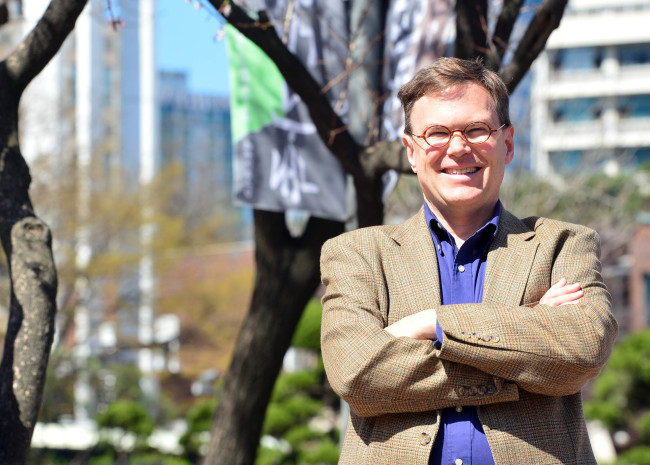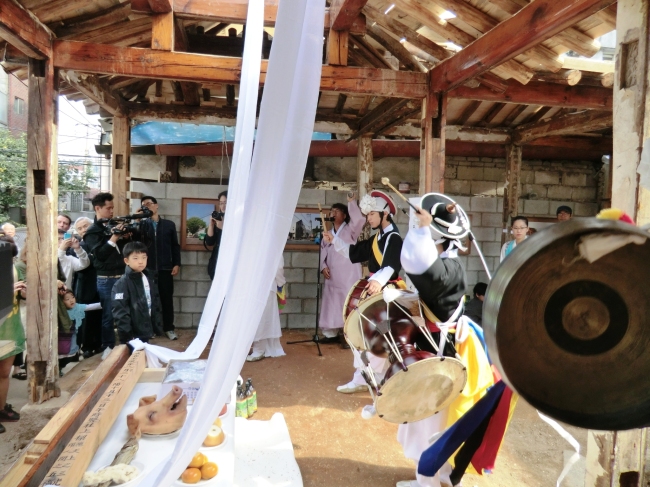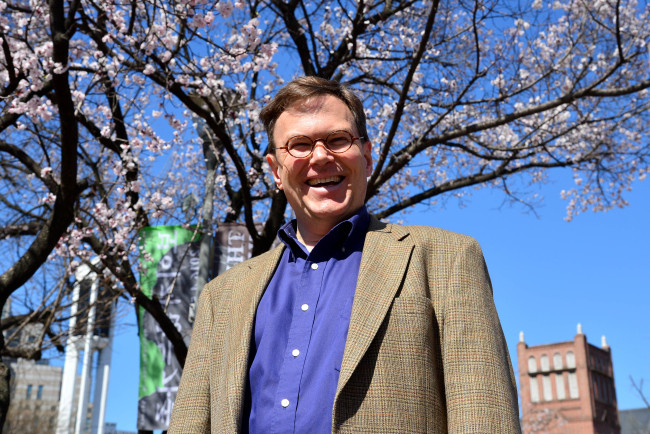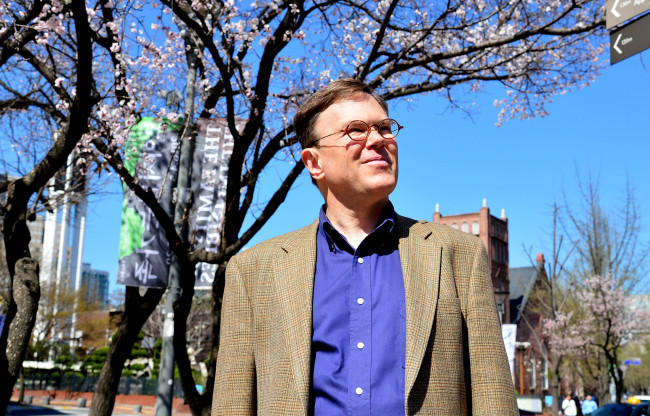[Eye interview] Scholar warns Korean youth to avoid passivity
Robert J. Fouser calls on young people to participate in politics, to push for changes
By KH디지털2Published : April 8, 2016 - 17:28
How does an “outsider” become an “insider?”
By building a house, a palpable demonstration of the determination to belong, discovered Robert J. Fouser, a columnist for The Korea Herald and former Seoul National University associate professor of Korean language education.
Fouser, who made local headlines when he became the first foreign Seoul National University tenure-track professor to teach Korean language education in 2008, was in the limelight again after he bought and renovated an old hanok -- Korean traditional house -- in Chebu-dong, a neighborhood west of the Gyeongbok Palace commonly referred to as Seochon, in 2013.
By building a house, a palpable demonstration of the determination to belong, discovered Robert J. Fouser, a columnist for The Korea Herald and former Seoul National University associate professor of Korean language education.
Fouser, who made local headlines when he became the first foreign Seoul National University tenure-track professor to teach Korean language education in 2008, was in the limelight again after he bought and renovated an old hanok -- Korean traditional house -- in Chebu-dong, a neighborhood west of the Gyeongbok Palace commonly referred to as Seochon, in 2013.

The news of an American advocating hanok conservation caught the attention of Koreans who wondered why a foreign professor would go through the trouble of buying a hanok in disrepair, an outdated, inconvenient residential environment in the minds of most people.
Fouser, who left Korea in 2014 for his hometown of Ann Arbor, Michigan, has returned to Seoul briefly on the occasion of the publication of his Korean-language book, “Conditions for Citizenship in the Future: A Manual of Democracy for Koreans.”
It seemed at first an odd subject for a book from Fouser, a linguist by training and widely known for his hanok conservation efforts. As he explained, he had wanted to write a book about Korea and he hit upon the topic -- citizen participation in politics -- after he became involved in Bernie Sanders’ campaign in Michigan last summer.

“It was the first time since college that I got involved in American politics. I was impressed with people’s energy, desire for change,” said Fouser during an interview with The Korea Herald in Jeong-dong, Seoul, Monday.
“Our problem in Korea is that, in general, citizens are passive, especially young people. I wanted to share my experience in becoming involved in politics,” Fouser said. The timing of the book’s release could not have been more prescient: Korea is holding general elections on April 13 and presidential election next year.
Citizen participation is a condition for democracy, Fouser points out. “Young people must have belief that your participation will make a difference. Something as simple as voting,” he said. “Deep democracy,” on the other hand, is the “idea of being involved (in politics) as an ordinary person. This is a challenge in older democracies as well,” he added.
Fouser made an interesting observation about the Korean system of “minwon” or filing petition with government offices, versus elected representatives. While he was at first very impressed with the minwon system’s efficiency in handling his complaints and requests, it also got him thinking about the role of the government and the role of the elected representatives. “We should make demands of our elected representatives and hold them accountable,” he said.

Warning that today’s passive youngsters will have an impact on the future of democracy, Fouser said that the young people today are “nervous about the future, worried that they will not be as prosperous as their parents.”
“I hope that young people will become more interested in politics, raising their concerns, demanding the system address those issues,” he said.
In his book, Fouser frequently refers to “social capital.”
“My definition of the terms is the connection you have from educational background, cultural activities and so on. It can be used to give you an advantage,” he said. “Redistribution of power means that the content of social capital becomes broader. More people can then have advantage of social capital.”
Fouser, who taught in Japan for several years before coming to Korea, noted that the country is more accepting of outsiders than Japan. However, Seoul National University was not like the rest of Korea.
“Institutions are alienating. It is not a ‘foreigner problem,’” he was quick to add. Despite being on a tenure track, he opted to leave the prestigious university because he did not want to be an outsider. “Institutions like people that are similar. Those that are not similar should push the institutions to be more accepting,” Fouser said.
“I was thinking of putting down roots here when I bought the house, although by the end of 2013, I wanted to leave SNU. More than that, I wanted to renovate a hanok,” Fouser said. “It is an old neighborhood with long-time residents. I was able to develop deeper relations with the residents when I started to renovate. It was one of the first hanok to be renovated and many homeowners in the neighborhood would come to watch the renovation,” Fouser recalled. “It encouraged them to value their houses.“

Following then Seoul Mayor Oh Se-hoon’s hanok conservation declaration in 2008, Seoul Metropolitan Government, in 2010, officially scrapped the renovation project planned for the Seochon neighborhood. Today, the area once earmarked for urban redevelopment, is having its moment, frequented by trendsetters always on the move to the next hot thing.
In the process of renovating his hanok, Fouser became the voice of grassroots movement working to preserve hanok. The sense of belonging which eluded him at the university, he found in his neighborhood.
Commenting on a recent survey that found Seoul National University lagging behind other institutions around the world in globalization, Fouser was quick to point out that SNU got off to a wrong start because it was seeking globalization for the wrong reason -- to boost its rankings.
“It was looking at university rankings. One way to improve the ranking was to improve internationalization. So it hired foreign professors. There was no strategy for what to do with these foreign teachers. Foreign professors who hadn’t been here before were lost,” he said.
“Globalization has to be part of the educational purpose. That should have been the reason,” Fouser said. While institutions often pursue globalization for external reasons, there must be a reason, ideology for it, he argued.
By Kim Hoo-ran (khooran@heraldcorp.com)








![[KH Explains] Hyundai's full hybrid edge to pay off amid slow transition to pure EVs](http://res.heraldm.com/phpwas/restmb_idxmake.php?idx=644&simg=/content/image/2024/04/18/20240418050645_0.jpg&u=20240419100350)






![[From the Scene] Monks, Buddhists hail return of remains of Buddhas](http://res.heraldm.com/phpwas/restmb_idxmake.php?idx=652&simg=/content/image/2024/04/19/20240419050617_0.jpg&u=20240419175937)

![[KH Explains] Hyundai's full hybrid edge to pay off amid slow transition to pure EVs](http://res.heraldm.com/phpwas/restmb_idxmake.php?idx=652&simg=/content/image/2024/04/18/20240418050645_0.jpg&u=20240419100350)

![[Today’s K-pop] Illit drops debut single remix](http://res.heraldm.com/phpwas/restmb_idxmake.php?idx=642&simg=/content/image/2024/04/19/20240419050612_0.jpg&u=)